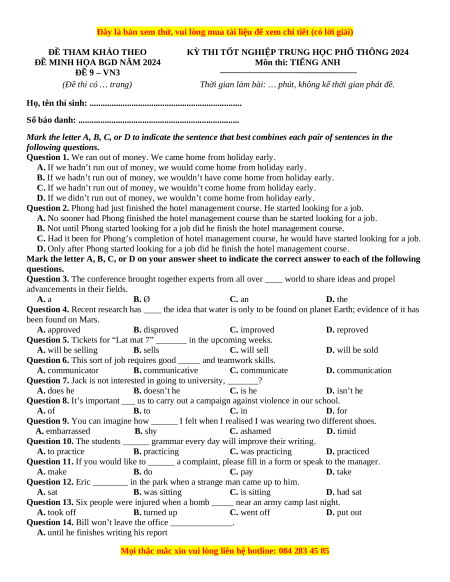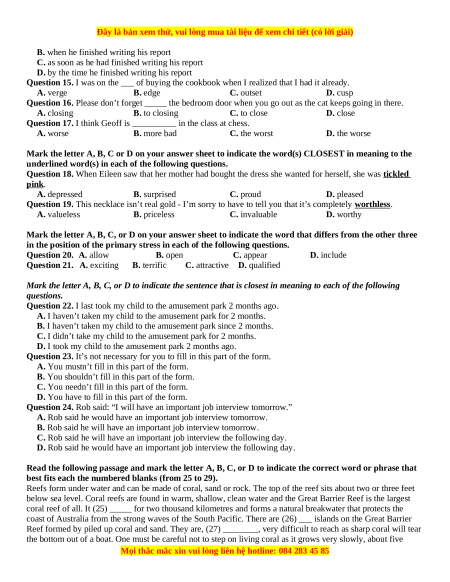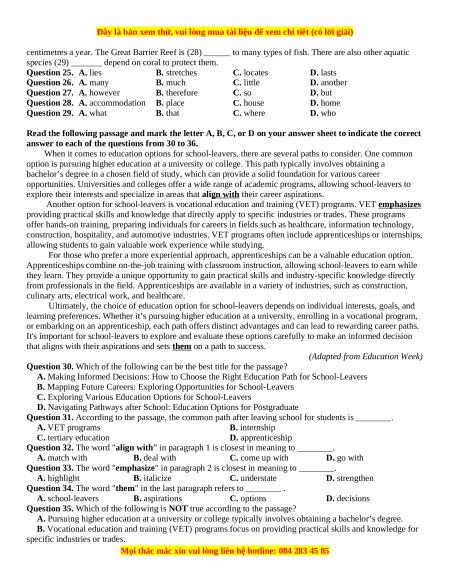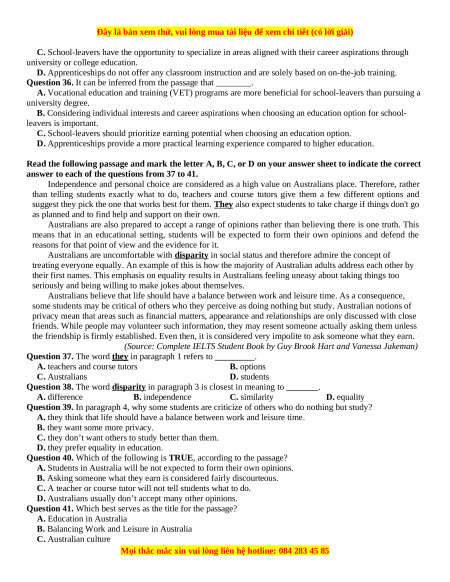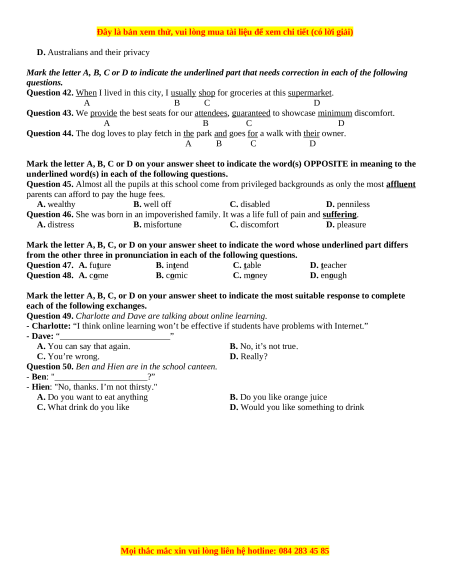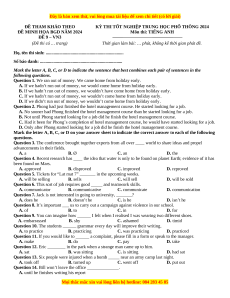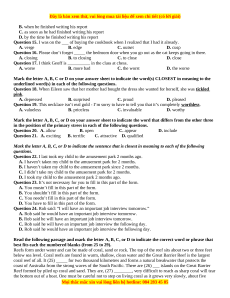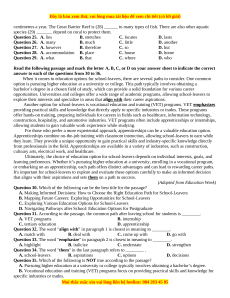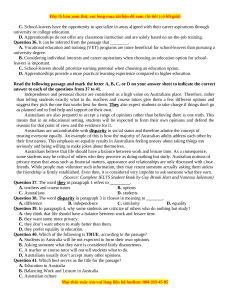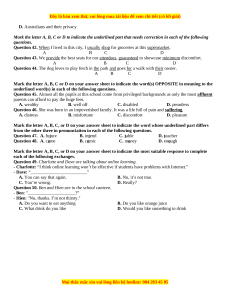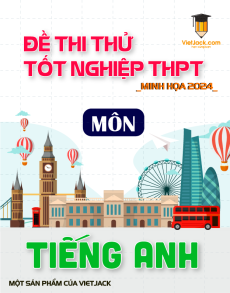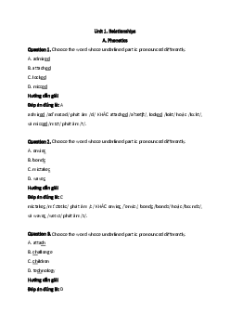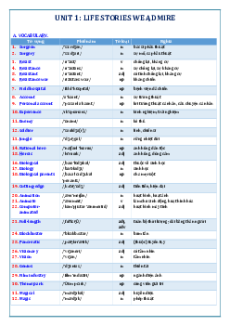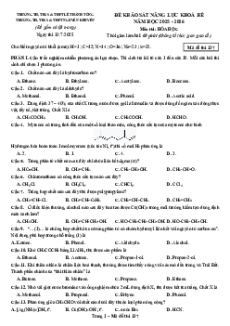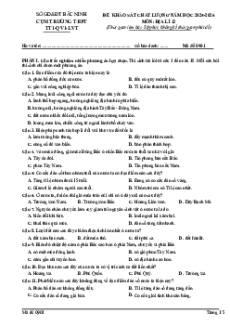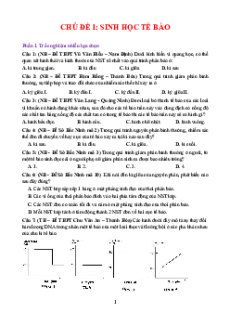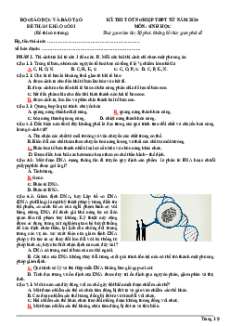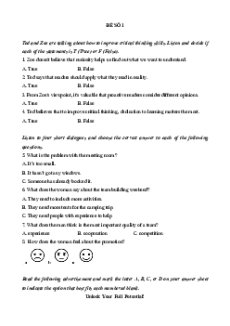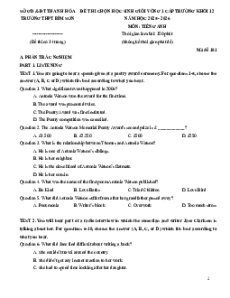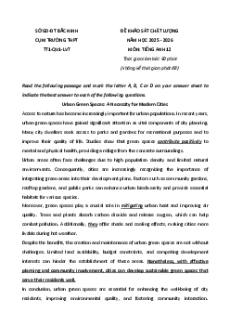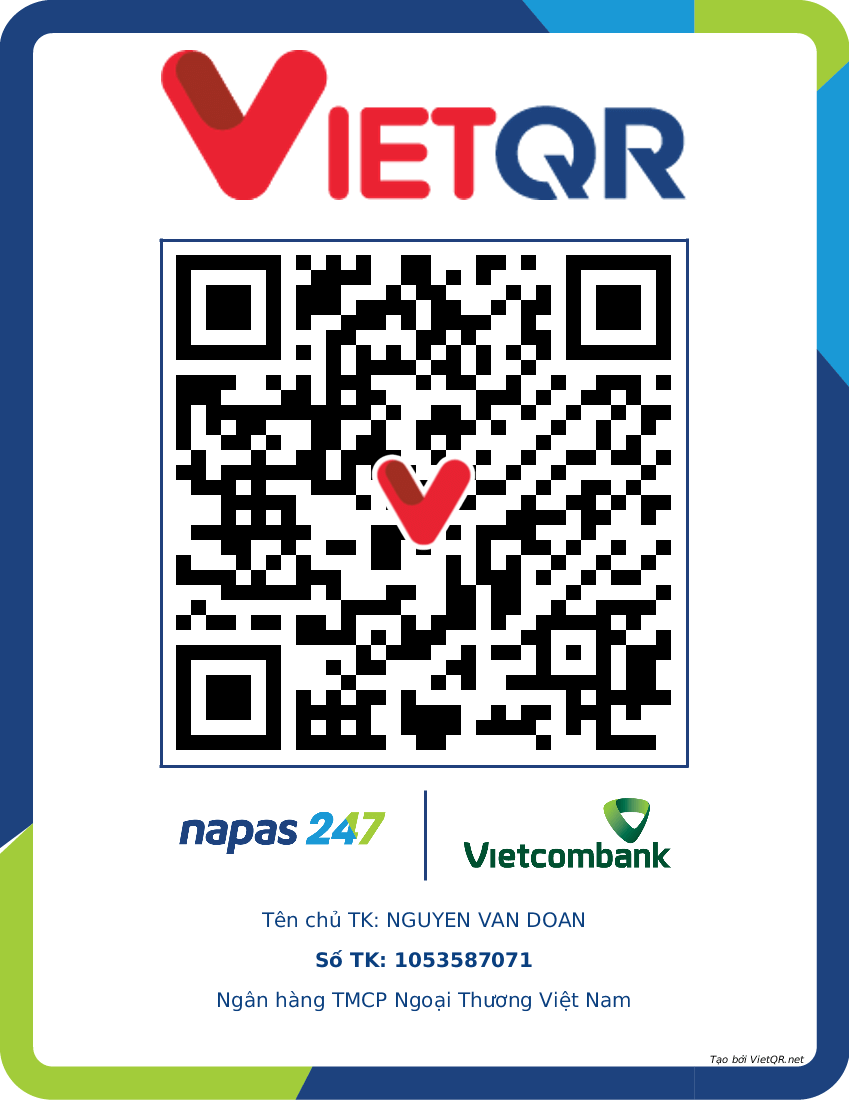ĐỀ THAM KHẢO THEO
KỲ THI TỐT NGHIỆP TRUNG HỌC PHỔ THÔNG 2024
ĐỀ MINH HỌA BGD NĂM 2024 Môn thi: TIẾNG ANH ĐỀ 9 – VN3
(Đề thi có … trang)
Thời gian làm bài: … phút, không kể thời gian phát đề.
Họ, tên thí sinh: .....................................................................
Số báo danh: .........................................................................
Mark the letter A, B, C, or D to indicate the sentence that best combines each pair of sentences in the following questions.
Question 1. We ran out of money. We came home from holiday early.
A. If we hadn’t run out of money, we would come home from holiday early.
B. If we hadn’t run out of money, we wouldn’t have come home from holiday early.
C. If we hadn’t run out of money, we wouldn’t come home from holiday early.
D. If we didn’t run out of money, we wouldn’t come home from holiday early.
Question 2. Phong had just finished the hotel management course. He started looking for a job.
A. No sooner had Phong finished the hotel management course than he started looking for a job.
B. Not until Phong started looking for a job did he finish the hotel management course.
C. Had it been for Phong’s completion of hotel management course, he would have started looking for a job.
D. Only after Phong started looking for a job did he finish the hotel management course.
Mark the letter A, B, C, or D on your answer sheet to indicate the correct answer to each of the following questions.
Question 3. The conference brought together experts from all over ____ world to share ideas and propel advancements in their fields. A. a B. Ø C. an D. the
Question 4. Recent research has ____ the idea that water is only to be found on planet Earth; evidence of it has been found on Mars. A. approved B. disproved C. improved D. reproved
Question 5. Tickets for “Lat mat 7” _______ in the upcoming weeks. A. will be selling B. sells C. will sell D. will be sold
Question 6. This sort of job requires good _____ and teamwork skills. A. communicator B. communicative C. communicate D. communication
Question 7. Jack is not interested in going to university, _______? A. does he B. doesn’t he C. is he D. isn’t he
Question 8. It’s important ___ us to carry out a campaign against violence in our school. A. of B. to C. in D. for
Question 9. You can imagine how ______ I felt when I realised I was wearing two different shoes. A. embarrassed
B. shy C. ashamed D. timid
Question 10. The students ______ grammar every day will improve their writing. A. to practice B. practicing C. was practicing D. practiced
Question 11. If you would like to ______ a complaint, please fill in a form or speak to the manager. A. make B. do C. pay D. take
Question 12. Eric ________ in the park when a strange man came up to him. A. sat B. was sitting C. is sitting D. had sat
Question 13. Six people were injured when a bomb _____ near an army camp last night. A. took off B. turned up C. went off D. put out
Question 14. Bill won’t leave the office ______________.
A. until he finishes writing his report
B. when he finished writing his report
C. as soon as he had finished writing his report
D. by the time he finished writing his report
Question 15. I was on the ___ of buying the cookbook when I realized that I had it already. A. verge B. edge C. outset D. cusp
Question 16. Please don’t forget _____ the bedroom door when you go out as the cat keeps going in there. A. closing B. to closing C. to close D. close
Question 17. I think Geoff is __________ in the class at chess. A. worse B. more bad C. the worst D. the worse
Mark the letter A, B, C or D on your answer sheet to indicate the word(s) CLOSEST in meaning to the
underlined word(s) in each of the following questions.
Question 18. When Eileen saw that her mother had bought the dress she wanted for herself, she was tickled pink. A. depressed B. surprised C. proud D. pleased
Question 19. This necklace isn’t real gold - I’m sorry to have to tell you that it’s completely worthless. A. valueless B. priceless C. invaluable D. worthy
Mark the letter A, B, C, or D on your answer sheet to indicate the word that differs from the other three
in the position of the primary stress in each of the following questions. Question 20. A. allow B. open C. appear D. include
Question 21. A. exciting B. terrific
C. attractive D. qualified
Mark the letter A, B, C, or D to indicate the sentence that is closest in meaning to each of the following questions.
Question 22. I last took my child to the amusement park 2 months ago.
A. I haven’t taken my child to the amusement park for 2 months.
B. I haven’t taken my child to the amusement park since 2 months.
C. I didn’t take my child to the amusement park for 2 months.
D. I took my child to the amusement park 2 months ago.
Question 23. It’s not necessary for you to fill in this part of the form.
A. You mustn’t fill in this part of the form.
B. You shouldn’t fill in this part of the form.
C. You needn’t fill in this part of the form.
D. You have to fill in this part of the form.
Question 24. Rob said: “I will have an important job interview tomorrow.”
A. Rob said he would have an important job interview tomorrow.
B. Rob said he will have an important job interview tomorrow.
C. Rob said he will have an important job interview the following day.
D. Rob said he would have an important job interview the following day.
Read the following passage and mark the letter A, B, C, or D to indicate the correct word or phrase that
best fits each the numbered blanks (from 25 to 29).
Reefs form under water and can be made of coral, sand or rock. The top of the reef sits about two or three feet
below sea level. Coral reefs are found in warm, shallow, clean water and the Great Barrier Reef is the largest
coral reef of all. It (25) _____ for two thousand kilometres and forms a natural breakwater that protects the
coast of Australia from the strong waves of the South Pacific. There are (26) ___ islands on the Great Barrier
Reef formed by piled up coral and sand. They are, (27) ________, very difficult to reach as sharp coral will tear
the bottom out of a boat. One must be careful not to step on living coral as it grows very slowly, about five
centimetres a year. The Great Barrier Reef is (28) ______ to many types of fish. There are also other aquatic
species (29) _______ depend on coral to protect them. Question 25. A. lies B. stretches C. locates D. lasts Question 26. A. many B. much C. little D. another
Question 27. A. however B. therefore C. so D. but
Question 28. A. accommodation B. place C. house D. home Question 29. A. what B. that C. where D. who
Read the following passage and mark the letter A, B, C, or D on your answer sheet to indicate the correct
answer to each of the questions from 30 to 36.
When it comes to education options for school-leavers, there are several paths to consider. One common
option is pursuing higher education at a university or college. This path typically involves obtaining a
bachelor’s degree in a chosen field of study, which can provide a solid foundation for various career
opportunities. Universities and colleges offer a wide range of academic programs, allowing school-leavers to
explore their interests and specialize in areas that align with their career aspirations.
Another option for school-leavers is vocational education and training (VET) programs. VET emphasizes
providing practical skills and knowledge that directly apply to specific industries or trades. These programs
offer hands-on training, preparing individuals for careers in fields such as healthcare, information technology,
construction, hospitality, and automotive industries. VET programs often include apprenticeships or internships,
allowing students to gain valuable work experience while studying.
For those who prefer a more experiential approach, apprenticeships can be a valuable education option.
Apprenticeships combine on-the-job training with classroom instruction, allowing school-leavers to earn while
they learn. They provide a unique opportunity to gain practical skills and industry-specific knowledge directly
from professionals in the field. Apprenticeships are available in a variety of industries, such as construction,
culinary arts, electrical work, and healthcare.
Ultimately, the choice of education option for school-leavers depends on individual interests, goals, and
learning preferences. Whether it’s pursuing higher education at a university, enrolling in a vocational program,
or embarking on an apprenticeship, each path offers distinct advantages and can lead to rewarding career paths.
It's important for school-leavers to explore and evaluate these options carefully to make an informed decision
that aligns with their aspirations and sets them on a path to success.
(Adapted from Education Week)
Question 30. Which of the following can be the best title for the passage?
A. Making Informed Decisions: How to Choose the Right Education Path for School-Leavers
B. Mapping Future Careers: Exploring Opportunities for School-Leavers
C. Exploring Various Education Options for School-Leavers
D. Navigating Pathways after School: Education Options for Postgraduate
Question 31. According to the passage, the common path after leaving school for students is ________. A. VET programs B. internship C. tertiary education D. apprenticeship
Question 32. The word "align with” in paragraph 1 is closest in meaning to ________. A. match with B. deal with C. come up with D. go with
Question 33. The word "emphasize" in paragraph 2 is closest in meaning to ________. A. highlight B. italicize C. understate D. strengthen
Question 34. The word "them" in the last paragraph refers to ________ . A. school-leavers B. aspirations C. options D. decisions
Question 35. Which of the following is NOT true according to the passage?
A. Pursuing higher education at a university or college typically involves obtaining a bachelor’s degree.
B. Vocational education and training (VET) programs focus on providing practical skills and knowledge for
specific industries or trades.
C. School-leavers have the opportunity to specialize in areas aligned with their career aspirations through
university or college education.
D. Apprenticeships do not offer any classroom instruction and are solely based on on-the-job training.
Question 36. It can be inferred from the passage that ________.
A. Vocational education and training (VET) programs are more beneficial for school-leavers than pursuing a university degree.
B. Considering individual interests and career aspirations when choosing an education option for school- leavers is important.
C. School-leavers should prioritize earning potential when choosing an education option.
D. Apprenticeships provide a more practical learning experience compared to higher education.
Read the following passage and mark the letter A, B, C, or D on your answer sheet to indicate the correct
answer to each of the questions from 37 to 41.
Independence and personal choice are considered as a high value on Australians place. Therefore, rather
than telling students exactly what to do, teachers and course tutors give them a few different options and
suggest they pick the one that works best for them. They also expect students to take charge if things don't go
as planned and to find help and support on their own.
Australians are also prepared to accept a range of opinions rather than believing there is one truth. This
means that in an educational setting, students will be expected to form their own opinions and defend the
reasons for that point of view and the evidence for it.
Australians are uncomfortable with disparity in social status and therefore admire the concept of
treating everyone equally. An example of this is how the majority of Australian adults address each other by
their first names. This emphasis on equality results in Australians feeling uneasy about taking things too
seriously and being willing to make jokes about themselves.
Australians believe that life should have a balance between work and leisure time. As a consequence,
some students may be critical of others who they perceive as doing nothing but study. Australian notions of
privacy mean that areas such as financial matters, appearance and relationships are only discussed with close
friends. While people may volunteer such information, they may resent someone actually asking them unless
the friendship is firmly established. Even then, it is considered very impolite to ask someone what they earn.
(Source: Complete IELTS Student Book by Guy Brook Hart and Vanessa Jakeman)
Question 37. The word they in paragraph 1 refers to .
A. teachers and course tutors B. options C. Australians D. students
Question 38. The word disparity in paragraph 3 is closest in meaning to . A. difference B. independence C. similarity D. equality
Question 39. In paragraph 4, why some students are criticize of others who do nothing but study?
A. they think that life should have a balance between work and leisure time.
B. they want some more privacy.
C. they don’t want others to study better than them.
D. they prefer equality in education.
Question 40. Which of the following is TRUE, according to the passage?
A. Students in Australia will be not expected to form their own opinions.
B. Asking someone what they earn is considered fairly discourteous.
C. A teacher or course tutor will not tell students what to do.
D. Australians usually don’t accept many other opinions.
Question 41. Which best serves as the title for the passage?
A. Education in Australia
B. Balancing Work and Leisure in Australia C. Australian culture
Đề Tốt nghiệp Tiếng Anh 2024 theo đề tham khảo (Đề 9)
2.2 K
1.1 K lượt tải
MUA NGAY ĐỂ XEM TOÀN BỘ TÀI LIỆU
CÁCH MUA:
- B1: Gửi phí vào TK:
1133836868- CT TNHH DAU TU VA DV GD VIETJACK - Ngân hàng MB (QR) - B2: Nhắn tin tới Zalo VietJack Official ( nhấn vào đây ) để xác nhận thanh toán và tải tài liệu - giáo án
Liên hệ ngay Hotline hỗ trợ: 084 283 45 85
Đề thi được cập nhật liên tục trong gói này từ nay đến hết tháng 6/2024. Chúng tôi đảm bảo đủ số lượng đề đã cam kết hoặc có thể nhiều hơn, tất cả có BẢN WORD, LỜI GIẢI CHI TIẾT và tải về dễ dàng.
Để tải tài liệu gốc về máy bạn click vào nút Tải Xuống ở trên!
Thuộc bộ (mua theo bộ để tiết kiệm hơn):
- Bộ đề thi thử Tốt nghiệp THPT Quốc gia môn Tiếng Anh năm 2024 theo đề tham khảo.
- File word có lời giải chi tiết 100%.
- Mua trọn bộ sẽ tiết kiệm hơn tải lẻ 50%.
Đánh giá
4.6 / 5(2239 )5
4
3
2
1
Trọng Bình
Tài liệu hay
Giúp ích cho tôi rất nhiều
Duy Trần
Tài liệu chuẩn
Rất thích tài liệu bên VJ soạn (bám sát chương trình dạy)
